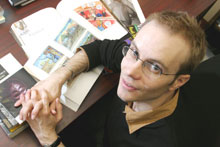Ivaska committed to teaching truth about Africa

Andrew Ivaska
Andrew Ivaska, Concordia's new professor of modern African history, calls his work "a unique opportunity that also presents huge challenges."
Teaching African history at a Western university involves overcoming widespread misperceptions about the continent. “Most students are coming from ground zero when it comes to Africa,” Ivaska said in an interview. “They haven't taken courses on Africa; they haven't lived in Africa.”
Moreover, Ivaska considers much of the media coverage of Africa, from which students gain their knowledge of the continent, to be distorted by the negative stereotypes about African backwardness and hopelessness.
Ivaska adds that “it's not only how Africa is covered, it's also how it's not covered” that is problematic. He says the sparse coverage of the five year-old war in the Democratic Republic of the Congo, which has killed an estimated four million people, is a “defining example" of the West's lack of attention to Africa.
“Every two or three months there will be a blurb on a massacre that has occurred," but otherwise, the war does not appear in the Western media. “I find that absence astounding in light of how much devastation is occurring.”
To combat stereotypes and a general lack of knowledge about the continent, Ivaska says he tries to present “a view of Africa that complicates some of the ways it's represented, and also that tries to redress some of the under-representation in the public media."
Ivaska uses African art and popular culture to introduce his students to the social and political history of what for many of them is an unfamiliar continent.
He also studies the links between culture and politics in his own work, which focuses on the Tanzanian metropolis of Dar es Salaam since the 1930s. He is looking at the tensions between official Tanzanian culture, as promoted by both colonial and postcolonial governments, and the “urban public culture” of Tanzania's largest city.
His work incorporates such elements as government policy, cultural artifacts such as films and novels, and interviews with individuals who lived through periods of the most heated debate about the country's culture, notably the 1960s and 1970s. Although he spent several years in Kenya as a child, which he credits for having given him an awareness of the world outside his native United States, Ivaska's initial academic work was not on Africa but on the Arab world.
However, while studying abroad in Cairo Ivaska had what he calls “a watershed year” which ultimately led him to turn to African history.
In Cairo he was introduced to post-colonial theory. “Reading that for the first time in the context of being in Cairo in the wake of the Gulf War, and making connections between what I was reading and what I was seeing on the street, was a galvanizing moment.”
His newfound awareness of a complicated postcolonial situation in much of the world, combined with a desire to work in Africa rather than the Middle East, ultimately resulted in what Ivaska calls his “commitment to researching and teaching about Africa in a way that hopefully complicates some of the norms of media coverage.”
Although he acknowledges that countering prejudices is not easy, painting a more complicated, truer picture of Africa is an important task, even if it involves fighting centuries of stereotype and neglect in the West.
“It's a challenge,” Ivaska said, “but in the best sense of the word.”